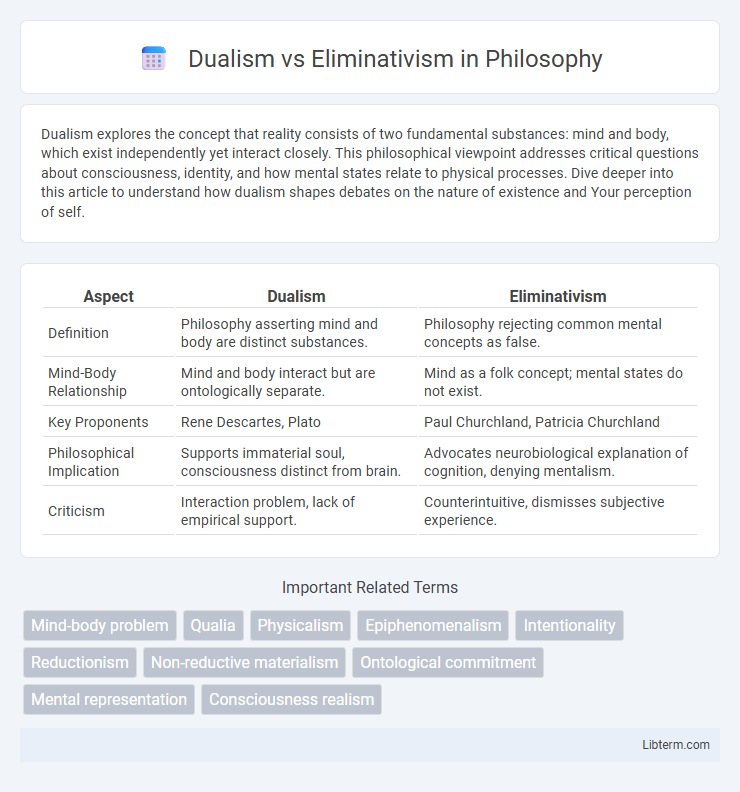Dualism explores the concept that reality consists of two fundamental substances: mind and body, which exist independently yet interact closely. This philosophical viewpoint addresses critical questions about consciousness, identity, and how mental states relate to physical processes. Dive deeper into this article to understand how dualism shapes debates on the nature of existence and Your perception of self.
Table of Comparison
| Aspect | Dualism | Eliminativism |
|---|---|---|
| Definition | Philosophy asserting mind and body are distinct substances. | Philosophy rejecting common mental concepts as false. |
| Mind-Body Relationship | Mind and body interact but are ontologically separate. | Mind as a folk concept; mental states do not exist. |
| Key Proponents | Rene Descartes, Plato | Paul Churchland, Patricia Churchland |
| Philosophical Implication | Supports immaterial soul, consciousness distinct from brain. | Advocates neurobiological explanation of cognition, denying mentalism. |
| Criticism | Interaction problem, lack of empirical support. | Counterintuitive, dismisses subjective experience. |
Introduction to Dualism and Eliminativism
Dualism posits that the mind and body are fundamentally distinct substances, with mental phenomena existing independently of physical processes. Eliminativism challenges common psychological concepts like beliefs and desires, arguing they are flawed folk theories that neuroscience will eventually replace with purely physical explanations. Both perspectives address the nature of consciousness but diverge sharply on whether mental states have an irreducible, non-physical reality.
Historical Background of the Mind-Body Debate
The mind-body debate has roots in ancient philosophy, with dualism notably advanced by Rene Descartes in the 17th century, asserting a fundamental separation between mind and body. Eliminativism emerged in the late 20th century within the philosophy of mind and neuroscience, challenging the existence of traditional mental states by arguing they are misconceived constructs. This historical progression reflects a shift from metaphysical dualism towards a scientifically informed skepticism about the reality of folk psychological concepts.
Key Concepts of Dualism
Dualism posits the existence of two fundamentally distinct substances: the mind and the body, emphasizing the immaterial nature of consciousness separate from physical processes. Key concepts include Cartesian dualism, which asserts that mental states are non-physical and cannot be reduced to brain activity, and interactionism, the idea that mind and body causally influence each other. Dualism contrasts with eliminativism, which denies the existence of mental states as real entities, instead attributing all cognitive phenomena to neural mechanisms.
Fundamental Principles of Eliminativism
Eliminativism asserts that common-sense mental states such as beliefs and desires do not have a neurobiological basis and should be discarded in favor of a scientific understanding of the mind. It fundamentally rejects dualism's notion of a separate, non-physical mind, instead positing that mental phenomena are reducible to brain processes. This approach emphasizes the elimination of folk psychological concepts, advocating for a neuroscience-based framework to explain cognition and consciousness.
Major Philosophers: Dualists vs Eliminativists
Rene Descartes, a seminal dualist, argued for the distinct existence of mind and body, emphasizing the non-physical nature of consciousness. In contrast, eliminativists like Paul Churchland reject traditional mental states, claiming that common-sense psychology is a flawed theory to be replaced by neuroscientific explanations. Gilbert Ryle criticized dualism as a "category mistake," while Patricia Churchland promotes eliminativism grounded in advances in cognitive neuroscience.
Arguments Supporting Dualism
Arguments supporting dualism emphasize the irreducibility of conscious experience to physical processes, highlighting phenomena such as qualia that resist explanation by neurobiological accounts alone. Philosophers cite introspective evidence and the persistence of subjective awareness despite physical changes as key points favoring a non-physical mind substance. Dualism also addresses the explanatory gap by asserting that mental states possess ontological properties that physicalism and eliminativism fail to capture.
Critiques and Challenges to Dualism
Dualism faces critiques primarily for its inability to explain the interaction between the non-physical mind and the physical brain, known as the mind-body problem. Neuroscience challenges dualism by providing increasing evidence that mental processes are closely tied to brain activity, undermining the notion of an independent immaterial mind. Moreover, eliminativism argues that common-sense psychological concepts like beliefs and desires are scientifically untenable, promoting a materialist ontology that directly conflicts with dualistic assumptions.
Core Arguments for Eliminativism
Eliminativism argues that common-sense mental states like beliefs and desires do not correspond to actual neurobiological processes, advocating for the replacement of folk psychology with a neuroscientific framework. Core arguments emphasize the explanatory failures of folk psychology, citing its inability to account for complex brain functions and mental disorders effectively. Proponents highlight advances in cognitive neuroscience that reveal neural correlates of cognition, suggesting that traditional mental state concepts are outdated and should be eliminated for a more accurate scientific understanding.
Eliminativism: Criticisms and Counterarguments
Eliminativism faces criticism for its radical rejection of folk psychological concepts like beliefs and desires, which some argue are indispensable for explaining everyday mental phenomena. Critics contend that eliminating these concepts undermines our ability to understand subjective experiences and social interactions effectively. Counterarguments emphasize advances in neuroscience that challenge traditional mental states, suggesting that eliminating outdated constructs can lead to more accurate scientific explanations of the mind.
Implications for Consciousness and Cognitive Science
Dualism posits that consciousness exists as a non-physical substance or property distinct from the brain, leading cognitive science to explore subjective experience through phenomenology and introspective methods. Eliminativism argues that common-sense mental states like beliefs and desires are illusory, suggesting cognitive science should abandon folk psychology concepts in favor of neural and computational models. These contrasting perspectives influence research approaches to understanding consciousness, with dualism emphasizing qualitative experience and eliminativism focusing on objective, brain-based explanations.
Dualism Infographic

 libterm.com
libterm.com